Community Development
hildren and Charity Myanmar plays an active role in community development. They work within the poor communities where children attending our preschools live and other nearby communities. Community development projects include medical assistance, housing, health and hygiene and employment/small business opportunities.
Housing
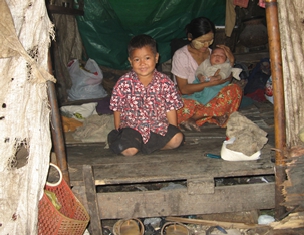
The housing situation for families in many of the poor communities where we work is very difficult. Many families (5-6 people) typically live in small (4 m x 4m) rickety homes constructed of bamboo poles or tarpaulins, often with a leaky thatch roof. If they are more well-to-do, they may have a tin roof. They do not have access to clean drinking water, toilets, reliable electricity or refrigeration. Often the only furnishing in these homes are sleeping mats which are rolled out at night, and cooking utensils. During the rainy seasons water regularly surrounds the homes and things become even more challenging. As we are able, we work with families to assist with home repairs (eg leaking roofs) or emergency housing.
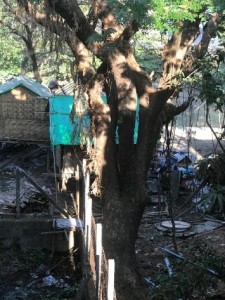 For example, we recently became aware one of our pre-school graduates and who is part of our scholarship program living in a potentially dangerous situation in makeshift accommodation. Her mother, a sole parent, had recently lost her job and consequently her rented housing. When we became aware of their situation, they were squatting in a very poor slum area, living under a tarpaulin. This student is currently in Grade 6 and has won academic and sporting awards every year since commencing primary school.
For example, we recently became aware one of our pre-school graduates and who is part of our scholarship program living in a potentially dangerous situation in makeshift accommodation. Her mother, a sole parent, had recently lost her job and consequently her rented housing. When we became aware of their situation, they were squatting in a very poor slum area, living under a tarpaulin. This student is currently in Grade 6 and has won academic and sporting awards every year since commencing primary school.
She is a very bright, motivated student and her mother is very supportive. In this tenuous living situation, their health was compromised, she was falling behind with her studies and was at risk of abuse in a house with no door, while her mother was working. A generous donor has made it possible to build a more substantial bamboo framed house with a tin roof for this young person and her mother. This will provide a safer environment, more conducive to being able to complete her studies. The cost of the new house was approximately $500 (AUD).
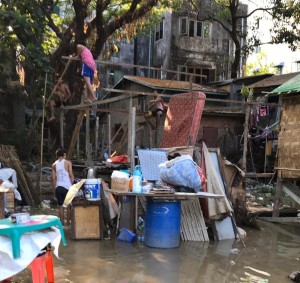
w house under construction. Note wooden stumps to raise the house above the water level
Crisis assistance
Families from our pre-school communities and other slum areas often approach us in times of need. There is no free or subsidized medical care in Myanmar, nor is there any social welfare income support. Most people in these communities work as day labourers, living a day to day existence. They often have no savings. If they experience a health crisis or a loss of employment this may precipitate a serious emergency. Both health and wellbeing may be seriously compromised at times leading to hunger, malnutrition and even death.
Children and Charity maintains a budget that allows us to respond to the most serious of these needs as we become aware of them. This may include medical consultations, assistance to purchase essential medications, dental care, or food. This assistance is made available to the poor dependent on funding available. At times the needs encountered seem overwhelming. All donations are gratefully received.
The Bible commends us “not to forget to do good and to share with others,
for with such sacrifices God is pleased” (Hebrews 13.16).
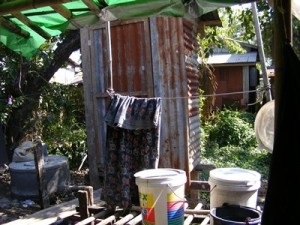
Health and Hygiene
Children and Charity has a vision to see the living situations of the poor in Myanmar improved through the provision of toilets, mosquito nets (Malaria and Dengue Fever are very real risks) and clean/safe drinking water for communal use. Projects such as these are beyond the normal scope of the Children and Charity budget. However, by developing partnerships with other organisations and NGOs it has been possible to facilitate some projects to address these needs.
For example in 2019, a group of travelers from e3Global (http://www.e3globaladventures.com.au/), raised funds for 160 water filters, which they distributed with Children and Charity Myanmar, to all of the families in the Dawpon slum community. This is the community where many of our preschoolers live. In Myanmar, gastrointestinal diseases are a leading cause of death among children (Weaver, Agius et al. 2016). These water filters mean that families now have a reliable supply of clean water for drinking.
Women’s Empowerment & Income Generating Projects
C&CM regularly organises meetings for women from the poor communities around the preschools to encourage the women and empower them to become actively involved in improving their family’s situation. Women have few opportunities outside of their homes and in these communities the mothers often have little or no formal education. These women rarely have a chance to meet together and encourage each other. They are often discouraged and feel that there is little they can do, as women, to change their circumstances.
C&CM is working to overcome these feelings of despondency and empower women to become agents of change within their families and their communities.
Examples of women’s empowerment and income generation projects include two recent initiatives: Soap Making Workshop and Women’s Hygiene Sewing Workshop.
Soap Making Workshop
In February 2020, 27 women came together for a soapmaking workshop. Dr Pat Dorsett, from the Australian C&CM Board shared with the women encouraging them to think about how things could be different and then take small actions to make changes.
Thai Vang then presented a workshop and demonstration on inexpensively making liquid soap which they could both use in their own homes and also sell. The women were excited to learn this new skill and some reported buying ingredients and making soap to sell the very next day. C&CM staff will continue to support and encourage these women as they develop a small business opportunity.
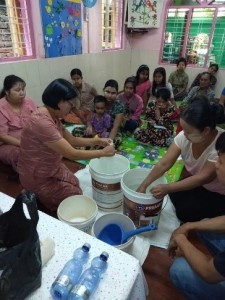
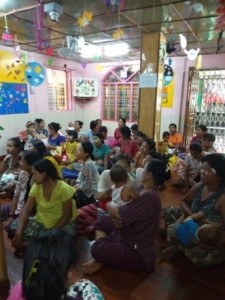
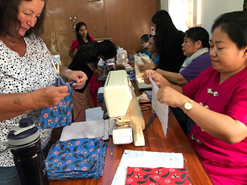 Women’s Hygiene Sewing Workshop
Women’s Hygiene Sewing Workshop
In March 2020 a team from OZBurma, an Australian Charity which supports work with the poorest of the poor in Myanmar (https://ozburma.org.au), visited and conducted workshops to teach local women to sew reusable feminine hygiene products.
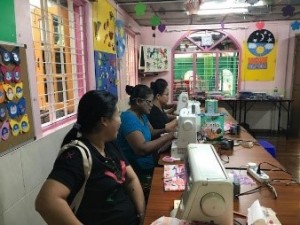
OZBurma also donated sewing machines which are now installed in the C&CM building. The sewing machines are available to women from the community for small business enterprises and making feminine hygiene products. This is a significant empowerment/small business initiative, because many girls and women in Myanmar are unable to afford to buy feminine hygiene products and therefore unable to attend school or work for several days each month.
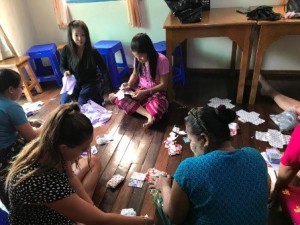
Reference
Weaver, E., et al. (2016). ” Water, Sanitation, and Hygiene Facilities and Hygiene Practices Associated with Diarrhea and Vomiting in Monastic Schools, Myanmar.” The American Journal of Tropical Medicine and Hygiene, 95(2): 278–287.